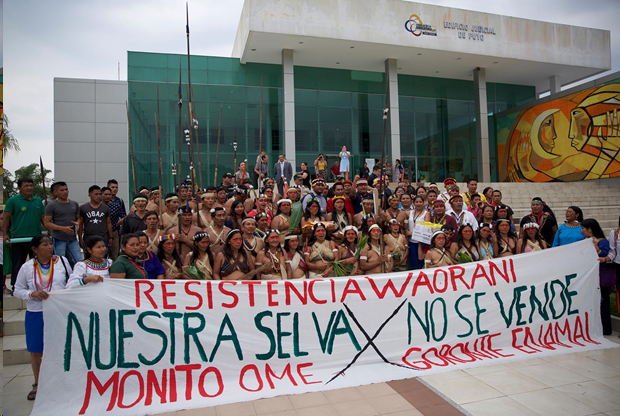The first barrels of Texaco oil were transported in a large military procession from the northern Amazon in Ecuador to the coast for processing and export in 1973. The parade included two indigenous women sitting on top of a tank, taken, most likely, by force from their territories and families. The promotional video shows people dipping their hands in oil, unaware that this “pro-development” promise of the nation-state would bring misery, cancer from contaminated water, forced prostitution, and continued displacement, instead benefits for local communities.
Today, 45 years later, indigenous peoples are more organized than ever, both regionally and in many provinces of Ecuador. CONAIE, the Confederation of Indigenous Nationalities of Ecuador, for example, includes regional organizations such as CONFENIAE (Confederation of Indigenous Nationalities of the Ecuadorian Amazon) and CONCONAWEP (Coordinating Council of the Waorani Nationality of Ecuador-Pastaza) in the Amazon, ECUARUNARI (Kichwa Conferderation of Ecuador) in the highlands and CONAICE (Confederation of Indigenous Nationalities and Peoples of the Ecuadorian Coast) on the coast; as well as local organizations such as the Waorani Pastaza resistance. Each organization also has its own community communication, radio and social media services to communicate with each other and the world at large. All these diverse indigenous groups in Ecuador are collaborating in the defense of their territories and women, in particular, are playing a historically more important role in the struggle for their rights and the rights of their communities, confronting the same old extractive policies promoted by transnational corporations and governments with the same old trickle-down economics theory through short-lived oil and mining projects.
Waorani people demand their right to prior consultation

As such, in February and March 2019, hundreds of Waorani people representing 16 communities took action to demand that the Ecuadorian government respect their right to prior consultation before moving forward with oil exploitation on their lands. They appealed in a joint press release to a previous consultation carried out in 2012, because it was conducted without adequate socialization and without taking into account linguistic and geographical barriers.
“These facts show that the State did not comply with national and international standards on prior consultation and, on the contrary, it was a process that instrumentalized this right, which apparently continues to be seen as a process of partial socialization of information and that seriously and apparently voluntarily ignores the spirit, scope and function of this right,” they said in their statement.

The Waorani spokesman, Oswaldo Nenquimo, and their lawyers explained on Radio Mokawa that they have asked the courts for precautionary measures of protective actions to annul the current oil concessions on their lands and respect the will and rights of the people. “We invite government officials to come and see the rainforest, to see our culture,” said Oswaldo, “we want justice to be delivered in our territory, so that the hearing can take place in the rainforest […] talk con the pekinane, our Council of Elders, our traditional authorities. “
The judge convened a last-minute public hearing on March 13 in the city of Puyo, which was rejected by the Waorani for being logistically too far away to provide interpreters in their native language. Faced with the judge’s rejection, the Waorani women burst into song:
“What my grandparents did, that is what we are doing now, without leaving traces anywhere. You cowore (mestizos), see now the reality of what we are. We come to ask you to respect our culture. Come to our territory, if you respect us you will come. We don’t want war like our ancestors, we just want to be heard. We want peace, understanding, comprehension.”
Faced with the women’s posture of resistance, and unable to understand them, the judge agreed to cancel the public hearing on the 13th and work under Waorani’s terms giving them at least 20 days before calling a new public hearing. According to Mongabay, the area where these 16 Waorani communities live is one of the best-preserved Amazonian regions because of its pristine nature, extensive biodiversity and lack of paved roads. Biologists, researchers from the Catholic University have found up to 182 species of amphibians alone. Scientists and indigenous peoples agree that when a dirt road begins, deforestation, animal trafficking and colonization follow, particularly in fragile environments.
The Waorani in southern Ecuador understand from the stories told by indigenous peoples in northern Ecuador that oil exploitation only brings death to their families and their way of life. As protectors of Mother Earth, they are facing a historic short-term vision of development but they know that this time, the majority of people fighting for climate justice are on their side.
